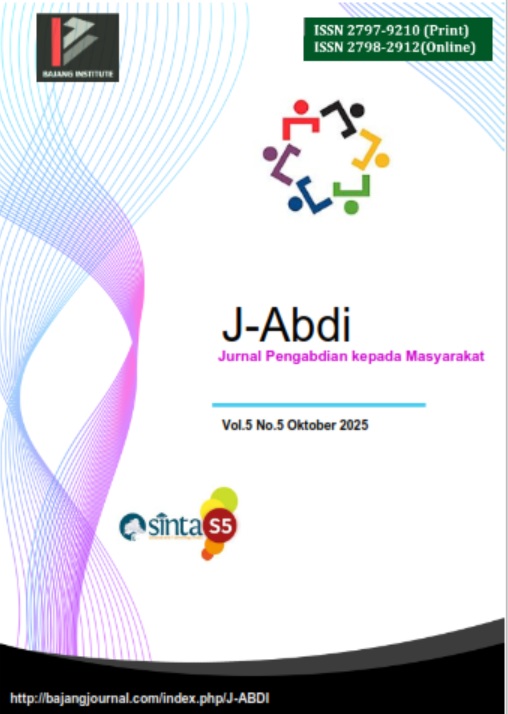PENCEGAHAN STUNTING, ANTI NARKOBA, DAN GERAKAN PEDULI LINGKUNGAN: PRAKTIK NYATA PENGABDIAN MAHASISWA KKN DI KELURAHAN LAKAHANG MAMASA
DOI:
https://doi.org/10.53625/jabdi.v5i5.11401Keywords:
Stunting, Anti-Drug, Environmental Awareness, KKN, Community EmpowermentAbstract
The Community Service Program (Kuliah Kerja Nyata / KKN) is one of the main pillars of higher education’s Tri Dharma that emphasizes direct community engagement. The 5th KKN program of Muhammadiyah University of Mamuju was conducted in Lakahang Village, Tabulahan District, Mamasa Regency, focusing on three strategic issues: stunting prevention, drug abuse prevention, and environmental awareness campaigns. The primary objective was to provide practical solutions to health, social, and environmental problems faced by the community, while simultaneously enhancing students’ social sensitivity and problem-solving skills. The program was implemented through participatory, educational, and collaborative approaches involving field observation, health counseling, awareness campaigns, practical demonstrations, community clean-up activities, and mentoring. The results showed an increase in mothers’ knowledge of balanced nutrition and child care during the first 1,000 days of life, the establishment of the “Lakahang Youth Anti-Drug Community” as a platform for youth empowerment, and greater public awareness of environmental cleanliness through the creation of simple waste bins and routine “Friday Clean-Up” activities. These findings confirm that KKN-based community service can make a tangible contribution to improving community well-being, fostering collective awareness, and strengthening the role of students as agents of social change.
References
Badan Narkotika Nasional Republik Indonesia. (2022). Indonesia Drug Report 2022. BNN RI.
Bandura, A. (1986). Social Foundations of Thought and Action: A Social Cognitive Theory. Prentice-Hall.
Carayannis, E. G., & Campbell, D. F. J. (2012). Mode 3 Knowledge Production in Quadruple Helix Innovation Systems. Springer. https://doi.org/10.1007/978-1-4614-2062-0
Chambers, R. (1994). Participatory Rural Appraisal (PRA): Analysis of Experience. World Development, 22(9), 1253–1268. https://doi.org/10.1016/0305-750X(94)90003-5
Huda, M., Jasmi, K. A., Basiron, B., Mustari, M. I., & Sabani, N. (2020). Empowering Society Through Community Service (KKN): Insights from Indonesian Higher Education. International Journal of Innovation, Creativity and Change, 11(12), 1–15.
Kementerian Kesehatan Republik Indonesia. (2022). Laporan Nasional Angka Stunting 2022. Kemenkes RI.
Prasetyo, A. R., & Hidayah, N. (2021). Pengelolaan lingkungan Berbasis Masyarakat dalam Mewujudkan Kebersihan Berkelanjutan. Jurnal Pengabdian Masyarakat Indonesia, 3(2), 112–121. https://doi.org/10.1234/jpmi.v3i2.112
Undang-Undang Republik Indonesia Nomor 18 Tahun 2008 tentang Pengelolaan Sampah. (2008). Lembaran Negara Republik Indonesia Tahun 2008 Nomor 69.
World Health Organization. (2021). Global Nutrition Report 2021: The State of Global Nutrition. WHO. https://www.who.int/publications















